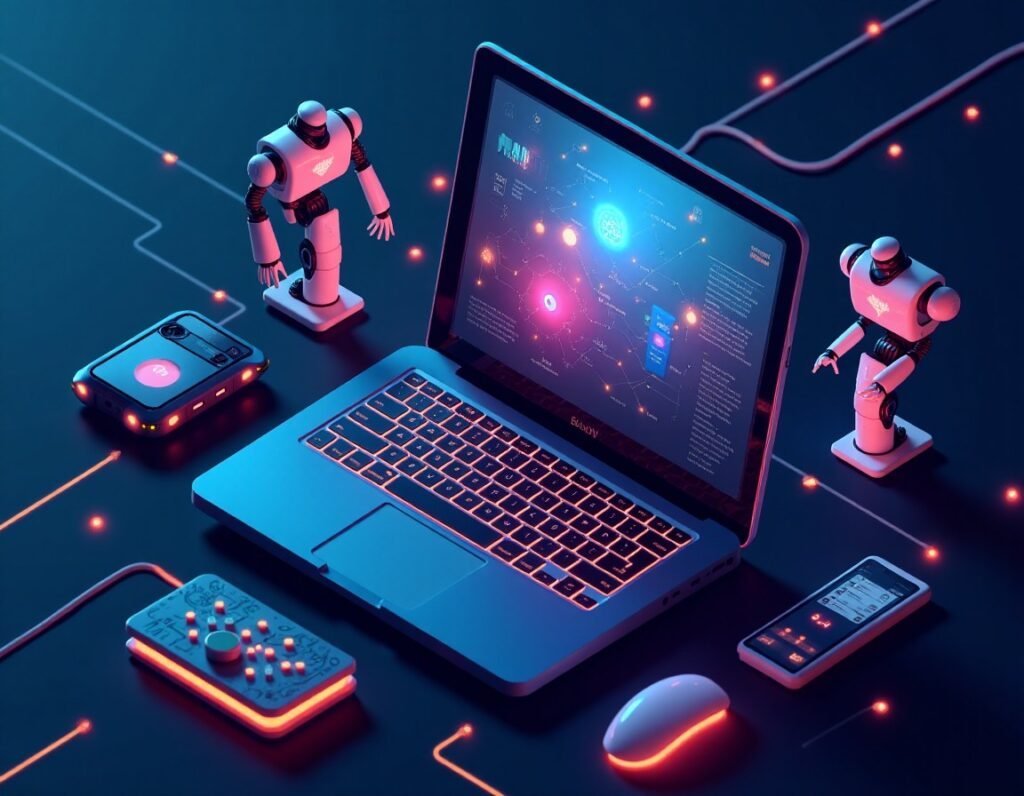“`html
Will AI-Powered Automation Solutions Replace Human Workers by 2030? As we dive into the future of work, one thing is clear: AI-powered automation solutions are revolutionizing industries at an unprecedented pace. In this article, we’ll delve into the world of innovative gadgets and tech trends to explore how these cutting-edge technologies can unlock efficiency, boost productivity, and transform businesses. From manufacturing to customer service, AI-powered automation solutions are poised to become a game-changer in the years to come. By understanding the benefits and limitations of these advanced tools, you’ll be better equipped to harness their potential and stay ahead of the curve in an increasingly automated world.
What is “AI-Powered Automation Solutions”?
AI-powered automation solutions refer to systems that use artificial intelligence to perform tasks traditionally done by humans. These solutions leverage machine learning, natural language processing, and robotics to automate complex processes, enhancing efficiency and accuracy across various industries.
Top 10 AI-Powered Automation Innovations Revolutionizing Industries
As we look towards 2025 and beyond, several AI-powered automation innovations are set to transform industries. Here are the top ten:
- Robotic Process Automation (RPA): Automates repetitive tasks, freeing up human workers for more strategic roles.
- AI-Driven Customer Service: Chatbots and virtual assistants provide 24/7 customer support, improving user experience.
- Predictive Maintenance: Uses AI to predict equipment failures, reducing downtime and maintenance costs.
- Smart Manufacturing: AI optimizes production processes, enhancing efficiency and reducing waste.
- Intelligent Supply Chain Management: AI improves logistics and inventory management, ensuring timely deliveries.
- AI in Healthcare: Automates diagnostics and patient monitoring, improving healthcare outcomes.
- Autonomous Vehicles: AI powers self-driving cars, revolutionizing transportation.
- Fraud Detection: AI identifies fraudulent activities in real-time, enhancing security.
- Personalized Marketing: AI analyzes consumer data to deliver targeted marketing campaigns.
- AI in Finance: Automates trading and risk management, optimizing financial operations.
How AI-Powered Automation Solutions Impact Different Sectors
The impact of AI-powered automation solutions varies across sectors, offering unique benefits and challenges:
Manufacturing
In manufacturing, AI-powered automation solutions streamline production lines, reduce errors, and enhance quality control. By integrating AI with IoT devices, manufacturers can achieve real-time monitoring and predictive maintenance, minimizing downtime.
Healthcare
Healthcare is witnessing a transformation with AI-powered automation solutions. From automating administrative tasks to enhancing diagnostic accuracy, AI is improving patient care and operational efficiency. AI-driven tools like IBM Watson are already assisting doctors in making informed decisions.
Finance
In finance, AI-powered automation solutions are optimizing trading strategies, detecting fraud, and managing risks. AI algorithms analyze vast datasets to provide insights, enabling financial institutions to make data-driven decisions.
Benefits and Challenges of AI-Powered Automation Solutions
While AI-powered automation solutions offer numerous benefits, they also present challenges:
- Increased Efficiency: AI automates repetitive tasks, allowing human workers to focus on strategic activities.
- Cost Savings: Automation reduces labor costs and minimizes errors, leading to significant savings.
- Scalability: AI systems can easily scale operations to meet growing demands.
- Job Displacement: Automation may lead to job losses, necessitating workforce reskilling.
- Data Privacy Concerns: AI systems require vast amounts of data, raising privacy and security issues.
Case Studies: Successful Implementation of AI-Powered Automation Solutions
Several companies have successfully implemented AI-powered automation solutions to enhance their operations:
Tesla’s Autonomous Vehicles
Tesla’s self-driving cars are a prime example of AI-powered automation solutions in action. By leveraging AI, Tesla has developed vehicles capable of navigating complex environments, reducing the need for human intervention.
Amazon’s Warehouse Automation
Amazon uses AI-powered automation solutions to optimize its warehouse operations. Robots and AI systems work together to manage inventory, streamline order fulfillment, and enhance delivery efficiency.
Comparing AI-Powered Automation Solutions Across Industries
| Industry | AI Application | Benefits | Challenges |
|---|---|---|---|
| Manufacturing | Smart Manufacturing | Increased Efficiency, Reduced Waste | High Initial Costs |
| Healthcare | AI Diagnostics | Improved Accuracy, Better Patient Care | Data Privacy Concerns |
| Finance | Automated Trading | Optimized Operations, Fraud Detection | Regulatory Challenges |
Will AI-Powered Automation Solutions Replace Human Workers by 2030?
While AI-powered automation solutions are transforming industries, they are unlikely to completely replace human workers by 2030. Instead, they will augment human capabilities, creating new roles and opportunities. The key lies in adapting to these changes and reskilling the workforce to thrive in an automated world.
Conclusion
The future of work is undoubtedly intertwined with AI-powered automation solutions. As industries continue to evolve, embracing these technologies will be crucial for staying competitive. By understanding the potential and limitations of AI, businesses can harness its power to drive innovation and growth.
For more insights on AI and automation, visit Top Gadgets Spot and explore our dedicated section on AI & Automation.
Additional Resources
Stay updated with the latest in AI and tech trends by following us at Top Gadgets Spot and subscribing to our AI & Automation section.
“`






